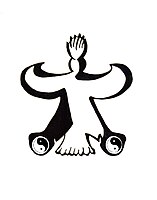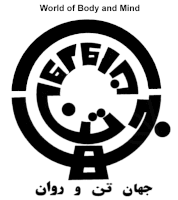Kung Fu To'a
| Date founded | 1968 - 1973 |
|---|---|
| Country of origin | Iran |
| Founder | Ibrahim Mirzaei |
| Ancestor schools | Northern and Southern Shaolin Kung fu, Gojuryu, Taekwondo |
Kung Fu To'a ([] error: {{lang-xx}}: no text (help)کونگ فو توآ) is a modern Iranian martial art, developed by Ibrahim Mirzaei in the 1960s. It is a unique style of Kung Fu with Yoga influences focused on a healthier mind and body. It is made up by combination of Northern and Southern styles of Shaolin Kung fu.[1] To'a training essentially depends on mastering combative forms (khat), which are unarmed as well as armed, with particular emphasis on physical and mental health and meditation practices. Today Kung Fu To'a is the most popular martial art in Iran after Kyokushin kaikan and Kickboxing with about 200.000 practitioners.[2]
Kung Fu To'a consists of about 73.000 techniques, combinations and reactions.[3] Dynamic wavelike movements and strong accentuation of techniques (called shock), frequently finished by a twist are characteristic for this martial art.
Pictures[edit]
This section is empty. You can help by adding to it. (October 2013) |
History[edit]
Kung Fu To'a was developed by the Iranian martial artist, Ibrahim Mirzaei from the 1950s to 1970s. Mirzaei developed and created his style aimed at allowing all body energy to be used at its best.
Financially supported by Iran's then-Shah, Mohammad Reza Pahlavi, Mirzaei started a journey through Asia in order to learn different martial arts and to create a unique style, which should have Iranian characteristics. His journey laid the foundation of Kung Fu To'a.
Mirzaei had an intricate knowledge of Tae Kwon Do / Karate / Southern Shaolin Kung Fu and Yoga with some Tai Chi. Mirzaei had 7th Dan in Okinawan Gojuryu.[4] These were combined to create Kung Fu To'a style. The mental and physical training of Kung Fu To'a renders the body lean, flexible, fast and very powerful able to unleash an enormous amount of power within a split second. It took Mirzai about 25 years to compile his unique style.
During the revolution in Iran in 1978/1979 the shah was overthrown. After the Iranian Revolution, To'a was banned (though there are many Kung fu to'a schools in Iran today). Mirzaei faced hostility from Islamic authorities, particularly for the spiritual aspects of his teaching. He was shot in his legs few years after the Revolution. Mirzaei first fled to Turkey, then to Europe but his whereabouts is still unknown.[5]
After prohibition in Iran and disappearance of Mirzaei, trainers in the Iranian diaspora continued to spread To'a. Today, it is organised in at least ten countries in Europe, Americas and Middle East.[6] A couple of years ago this style was legalised as a sport again in Iran, not as a philosophy, and is nowadays one of the most popular martial arts there. Nevertheless To'A is in other countries still a quite unknown Kung Fu style. Several movies about e.g. Shaolin Kung Fu made these styles more famous than To'A.
The seven Forms[edit]

There are mainly seven forms in Kung Fu To'A. Instead of form terms like khat or line are in common usage as well. A form is a fix motion sequence composed of many different techniques, which serve as self-defence and attacks or follows energetic aspects. Each of these forms will be examined by at least one master. If a practitioner passes an examination he gets a stripe on his right chest of the training jacket.
Beyond the physical education each of the seven forms(Persian= "khat"- English="line") deals with a given philosophical topic.
1. Anato'A
2. Atado
3. Soto
4. Samsamae
5. Mayane
6. Kuanne & Vest Mayane
6.: The sixth grade of Kung Fu To'A consists of two forms: Kuanne and Vest Mayane
7. Vaymabato
8. Kogoy muo (Anato'A sabz)
9. Sai
10. Rey kimma
11 - 21. ( is Unknown )
Officially a green belt is given for To'A students after they passed the examination of the seventh form. When a student passes the examination for the master grade, a red jacket is handed to him. Originally further forms without weapons have been planned, based on the existing forms. Because of the given historical events (prohibition of Kung Fu To'A, attack on Mirzaei) only "Anato'A sabz" (also called green or brown Anato'A) was officially passed on. Since these additions to the system of Kung Fu To'A starting with Anato'A sabz haven't been completed, Vaymabato can be considered as a close. Thus, several schools already pass the black belt after the seventh form instead of the green belt.
There are, though, two additional weapon forms, which have been passed on: Sai and Rokeyma (Sword).
Belt[edit]

The belt is of red fabric and has a broad coloured stripe in its middle. According to the student's level the middle stripe can be white, green, brown or black. The red belt is supposed to be worn only by Grandmaster Mirzaei.
A folded belt has on one side three folds of different sizes representing "Think well. Talk well. Act well.".
Philosophy[edit]
Kung Fu is the world of motion, motion of power, motion of beauty, motion of justice and humanity, motion to a healthy society. Kung Fu is motion to pure thought, where its secret lies in the language of the soul. This means the path of heart, the (re)discovery of pure knowledge, which we already have in us. Kung Fu To'A practices use the body as a "portal" to this path. By powerful motion Kung Fu teaches you strength and courage to let go of known, to reexperience who you are and to realize the whole spectrum of your soul.
Another way to achieve self-awareness is meditation. It is used for cleaning your mind, freeing from thoughts to enhance presence and to face your ego.
An analogue to the path of pure heart and to the teachings of the seven forms of Kung Fu To'A can be found in Persian literature: "The Conference of the Birds" by Fariduddin Attar.
Phoenix - the Simorgh[edit]
"Phoenix" ("Manteq-ot-teir") by Fariduddin Attar is a Persian story about thousands of birds starting a journey through seven alleys to find Simorgh - king of the birds. The seven alleys are the alley of desire (let go of property), the alley of love (let go of learned moral concepts like "Good" and "Bad" and feeling the pure emotion of love), the alley of knowledge (breakout from familiarity and realizing the connection between body and mind), the alley of self-sufficiency (abandonment of knowledge and heart and to quest for new), the alley of unity (realize that everything in our world is connected to each other), the alley of confusion (establishes different perspectives on being and not-being, you realize your mortality and immortality at the same time) and at last the alley of death (achieving immortality by accepting to become part of the whole). Each of the seven alleys is a hurdle and represents an attribute the birds have to let go of to reach the Simorgh. The birds learn more and more about who they really are.
Of all birds only 30 achieve their goal and being there they realize that they are the Simorgh. The term "Simorgh" consists of the Persian words for "thirty" (si) and "birds" (murgh).
Symbolism[edit]
One of the most common symbols of Kung Fu To'A is a falcon with spread wings. This could be originated in a tale about the Simorgh, where he spreads with one flap the seeds of the tree of life all over the world. Furthermore falcons are considered to be extremely beady-eyed and sharp-sighted. Their eyesight, hunting abilities, grace and force at flying are outstanding characteristics. "The falcon teaches us control of speed and motion, as well as patience. He represents recognizing opportunities and to act at the right time. He teaches us that we have to make great efforts to achieve great success. He represents leadership, prudence and caution. He stands for a fast, graceful mind and for how to use our mental capabilities more effectively to "catch" what we need and want the most by being more patient." [7]
- The following pictures show the most common symbols in Kung Fu To'A.
-
A falcon with spread wings. Commonly globes or Yin and Yang are shown in its claws.
-
Union of the mind and the body
-
Circular arranged Persian writing meaning "world of body and mind".
Techniques[edit]
A characteristic technique of this Kung Fu style is the so-called shock. The shock is a strong accentuation at the end of a motion. Being fast and precise is more important than pure physical strength for using this technique. Many techniques are finished by a (small) rotation to transfer maximum force to the imaginary opponent.
Furthermore the energy of the last applied technique (of your own or by your opponent) shall be used for the next technique. This is necessary for higher forms since they take very long and can be mastered only by applying dynamic techniques and a good breathing technique.
References[edit]
- ↑ Kung Fu Masters, Ibrahim Mirzaei International Kung Fu Federation
- ↑ "The History of the Iranian Martial Art Kung Fu To'a". Retrieved 2010-09-14.
- ↑ "Kung Fu To'a Germany". Retrieved 2011-01-13.
- ↑ Biography of Mirzaei (in Persian)
- ↑ Ibrahim Mirzaei Biography
- ↑ Kung Fu To'a International
- ↑ "Kung Fu To'A - The falcon". Retrieved 2010-10-08.
External links[edit]
- kung fu To'a Italia Mirzaei Style
- Kung Fu To'a Italia
- Kung Fu To'a International
- Kung Fu To'a Bulgaria
- Kung Fu To'a
- International Netherland Kung Fu To'a - SIMORGH Organization
- Kung Fu To'a
- Photos of the opening ceremony of World TO'a Championship 2011 in Shiraz, Iran
This article "Kung Fu To'a" is from Wikipedia. The list of its authors can be seen in its historical. Articles copied from Draft Namespace on Wikipedia could be seen on the Draft Namespace of Wikipedia and not main one.



